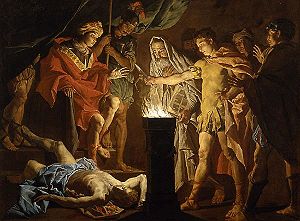- Mucia (gens)
-
 Gaius Mucius Scaevola in the Presence of Lars Porsena, oil on canvas painting by Matthias Stom, early 1640s, Art Gallery of New South Wales
Gaius Mucius Scaevola in the Presence of Lars Porsena, oil on canvas painting by Matthias Stom, early 1640s, Art Gallery of New South Wales
The gens Mucia was an ancient and noble patrician house at Rome. The gens is first mentioned at the earliest period of the Republic, but in later times the family was known primarily by its plebeian branches.[1]
Contents
Origin of the gens
The first of the Mucii to appear in history is Gaius Mucius Scaevola, a young man at the inception of the Roman Republic. According to legend, he volunteered to infiltrate the camp of Lars Porsena, the king of Clusium, who besieged Rome circa 508 BC, and who may in fact have captured and held the city for some time. Mucius, armed with a dagger, attempted to assassinate Porsena, but unfamiliar with Etruscan dress, he mistook the king's secretary for the king, and was captured.
Brought before the king, Mucius declared that he was but one of three hundred Roman men who had sworn to carry out this mission, or die in the attempt. As a show of bravery, it was said that he thrust his right hand into a brazier, and stood silently as it burned. Porsena was so impressed by his courage and endurance that Mucius was freed, and some traditions held that Porsena withdrew his army in fear of the threat of assassination invented by the young Roman.[2]
Praenomina used by the gens
The chief praenomina used by the Mucii were Publius, Quintus, and Gaius, all of which were very common throughout Roman history.[3]
Branches and cognomina of the gens
The only major family of the Mucii bore the cognomen Scaevola. This surname is said to have been acquired by Gaius Mucius, who lost the use of his right hand following his attempt on the life of Lars Porsena, and was subsequently called Scaevola because only his left hand remained. Scaeva refers to the left, and occurs in other gentes, including the Junii. It seems possible that Scaevola arose as a diminutive of Scaeva, but in ordinary usage, scaevola referred to an amulet.
The only other important cognomen of the Mucii was Cordus, borne by some of the Scaevolae. According to some traditions, Gaius Mucius was originally surnamed Cordus, and assumed the surname Scaevola on account of his deed before Porsena. However, it may be that the tradition concerning his right hand was a later addition to the story, intended to explain the descent of the Mucii Scaevolae from one of the heroes of the Republic. Although Gaius Mucius was a patrician, the later Mucii Scaevolae were plebeians.[4][5]
Members of the gens
- This list includes abbreviated praenomina. For an explanation of this practice, see filiation.
- Gaius Mucius Scaevola, attempted the life of Lars Porsena, circa 508 BC.
- Publius Mucius Scaevola, father of the praetor of 215 BC.
- Quintus Mucius P. f. Scaevola, praetor in 215 BC, received Sardinia as his province. His command there was prolonged for three years.[6]
- Quintus Mucius Q. f. P. n. Scaevola, consul in 174 BC.[7]
- Publius Mucius Q. f. P. n. Scaevola, consul in 175 BC, triumphed over the Ligures.[8][9]
- Publius Mucius (P. f. Q. n.) Scaevola, consul in 133 BC; two years later he succeeded his brother, Publius Licinius Crassus Dives Mucianus, as Pontifex Maximus. He was regarded as one of the founders of the ius civile.
- Publius Licinius Crassus Dives Mucianus, Pontifex Maximus, and consul in 131 BC; he was defeated and killed by Aristonicus.
- Quintus Mucius Q. f. Q. n. Scaevola, called the augur, consul in 117 BC.
- Mucia Q. f. Q. n., the elder daughter of Quintus Mucius Scaevola, the augur, married Lucius Licinius Crassus, the orator, who was consul in 95 BC. with her cousin, Quintus Mucius Scaevola.
- Tertia Mucia Q. f. Q. n., better known as Mucia Tertia, the younger daughter of the augur, married Gnaeus Pompeius, the triumvir.
- Quintus Mucius P. f. (P. n.) Scaevola, son of the Pontifex Maximus, was consul in 95 BC, and later himself became Pontifex Maximus. He was murdered during the proscription of the younger Marius.
- Gaius Licinius Mucianus, consul in AD 52, 70, and 75; a general, statesman, orator, and historian praised by Tacitus, he was a strong supporter of Vespasian.
See also
- List of Roman gentes
Footnotes
- ^ Dictionary of Greek and Roman Biography and Mythology, William Smith, Editor.
- ^ Titus Livius, Ab Urbe Condita, ii. 12, 13.
- ^ Dictionary of Greek and Roman Biography and Mythology, William Smith, Editor.
- ^ Titus Livius, Ab Urbe Condita, ii. 13.
- ^ Marcus Terentius Varro, De Lingua Latina libri XXV, vi. 5.
- ^ Titus Livius, Ab Urbe Condita, xxiii. 24, 30, 34, 40, xxiv. 9, 44, xxv. 3, xxvii. 8.
- ^ Titus Livius, Ab Urbe Condita, xl. 44, xlii. 49, 67.
- ^ Titus Livius, Ab Urbe Condita, xl. 44, xli. 19.
- ^ Fasti Triumphales.
This article incorporates text from the public domain Dictionary of Greek and Roman Biography and Mythology by William Smith (1870).
Categories:- Roman gentes
- Ancient Roman families
- Prosopography of Ancient Rome
- Mucii
Wikimedia Foundation. 2010.
